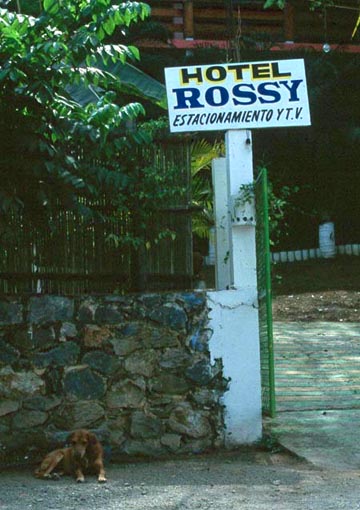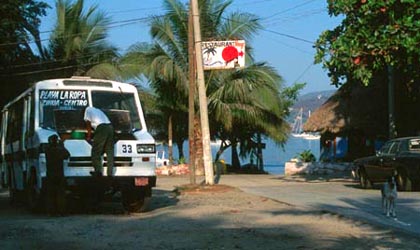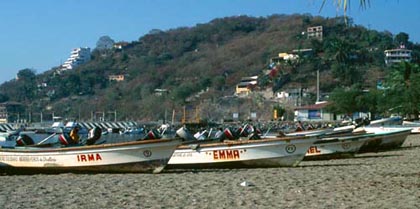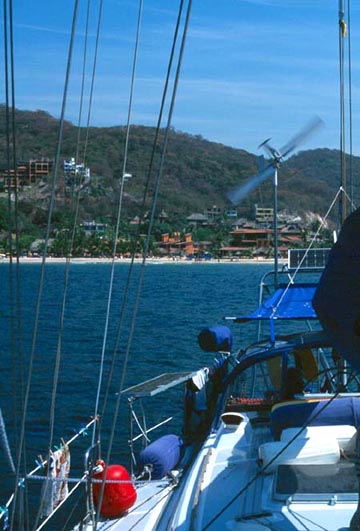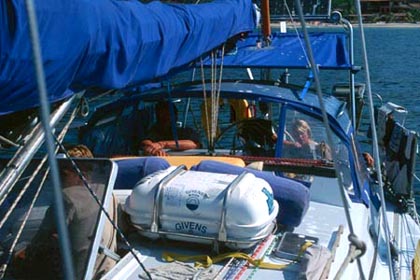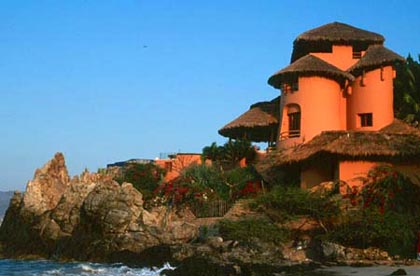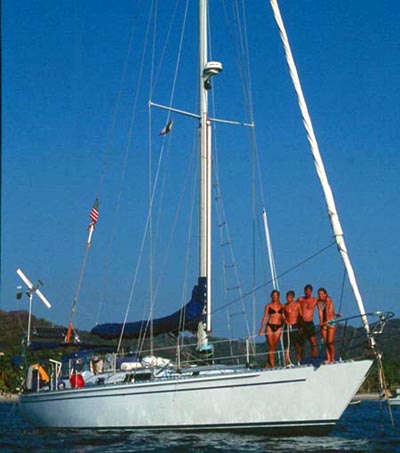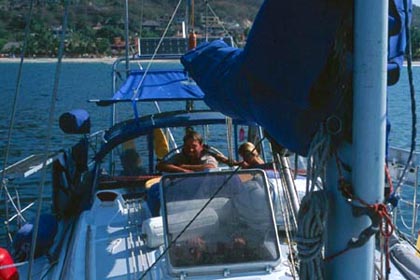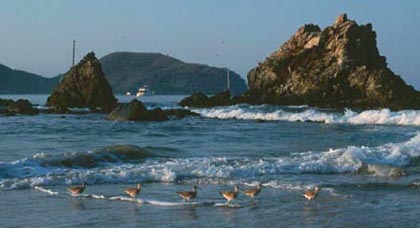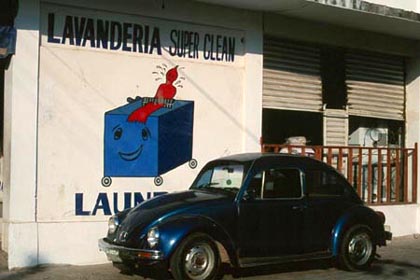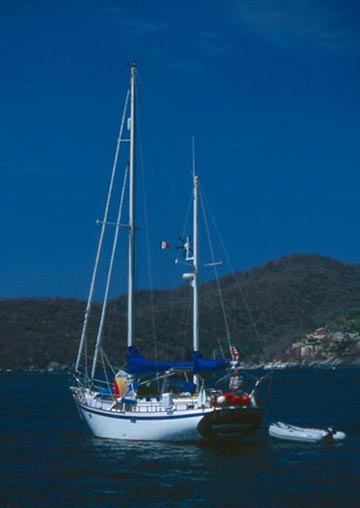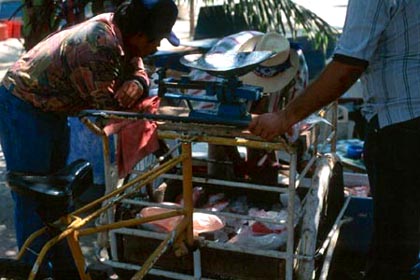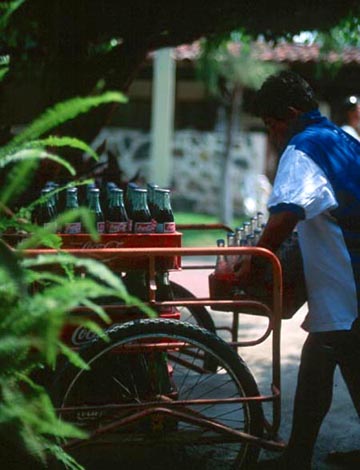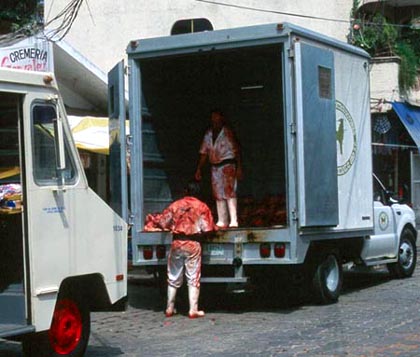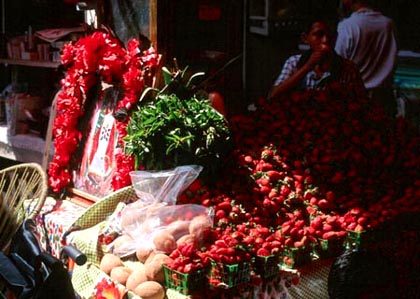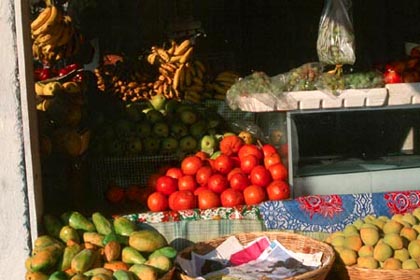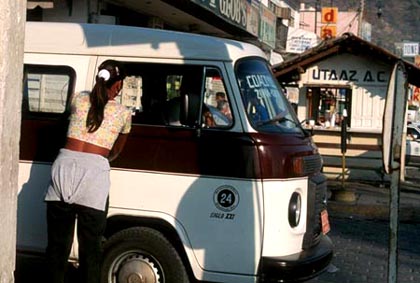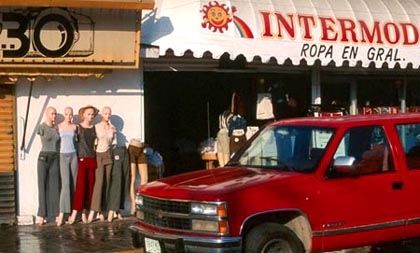|
This was a very brief trip to Zihuatenajo (three nights) with my father to visit friends who were then on their way around the world on their 44-foot Nordic sailboat. For details, photos and a log of their trip, see http://www.goals.com/WarmWindsHome.asp.
The images in the following were scanned
from 35mm slides, originating from Fuji Velvia film. The text is transcribed
from a journal.
Hotel Rossy, Zihuatanejo, Mexico
Tuesday, February 15, 2000 Flight to LA then ZIH via Alaska Airlines. There is a mechanical failure and we have to get off the plane before departure. But there are no complaints from passengers; this is the same model of Alaska Airlines jet (the MD-80) that crashed due to a mechanical failure two weeks earlier. We all want it fixed properly, whatever the problem. The new estimated departure time is more than an hour late, so there seems no way I can make my connection in LA. Instead I decide to go standby on a another LA-bound flight, although it is virtually certain that my bags won’t make it to ZIH with me. The connection in LA allows only twelve minutes between my new flight landing and the flight to ZIH taking off, but the ZIH-bound plane is held for ten minutes so five of us in the same situation are able to get on. Again, I have almost zero chance of getting my bags. Not a big problem, though… Arrive ZIH, and sure enough there are no bags. I'm met at the airport by my father Roy and Tina. I've apparently missed seeing Tina’s mother and sister, who have are already aboard the airplane that I have arrived on, on their way back to Seattle. We take a taxi to the Rossy Hotel, a cheap but clean two-story place just a block from the beach. No view, but there are hammocks strung in front of each room, the water runs properly (hot and cold) and the toilet flushes reliably. The hotel is painted a bright combination of orange and pick, the hammocks are neon blue, and the front iron gate is a rust-stained green. The place is surrounded by well-maintained palm trees and is down a quiet street at the very end of the Playa de la Ropa. A good choice. Tina leaves us to unpack our things; although my father has been here for a week, this is his first night in this hotel. My unpacking (for obvious reasons) takes no time at all, and soon we are down on the beach, where me meet Tina again. She has a hand-held VHF, and she is hailing Dale to come and pick her up. Soon Dale arrives in a red Zodiak dinghy with the two kids, Kaitlin and Austin. We talk for a while on the beach, and I catch a ride out to the boat, soaking my jeans while getting in the dinghy to borrow a pair of shorts and a t-shirt from Dale. Roy and I leave the Ingalls at the beach, go back to the hotel (where I change out of the wet jeans and into the shorts), then together we take a public bus (packed with people, some hanging out the door) into Zihuatanejo town for dinner. We walk for a while before choosing a small place on the beachfront. To Roy’s amusement I bring my laptop computer and check in at an internet cafe. Nobody within Protel knows that I am in Mexico, and it has been a busy week. Checking emails and phone messages, I discover that I’ve been asked to arrange a telephone interview with an editor the following morning. I call the editor and leave a message, then call Australia (from a phone booth, as there is no phone in the hotel) to tell the marketing manager that the interview is tentatively scheduled. I have a nagging concern that I don’t have enough background information for the interview so I decide I’ll call Bruce Edwards in the morning.
Bus stop at the Hotel Rossy, Playa La Ropa, Zihuatanejo
I sleep well; the bed is hard but that’s the way I like it. No air conditioning, but the overhead fan blows a strong breeze onto the bed. In the morning I wake early, as does my father. We take a long walk down the beach looking for breakfast, then change our minds and take a taxi into Zihua. The 10-minute taxi ride from Playa de la Ropa is 200 pesos (around two dollars) and we make the trip many times over the three days I’m there. We choose a small beachfront café named Daniel’s and each order a “breakfast” special omelette. For just over three dollars each, we are treated to a large ham and cheese omelette with salsa, a plate of excellent cut fruits, coffee and fresh-squeezed orange juice. Outstanding food, great view and cheap prices; we vow to come back. We’ve loosely agreed with the Ingalls to meet on the beach at Playa de la Ropa sometime after 10:00 AM. We go to the spot on the beach directly in front of where the boat is anchored just a few hundred yards off the beach. After thirty minutes there is still no sign of life on the boat (the dingy is tied to the rear) so we rent two chairs and an umbrella (a little more than two dollars for the day) and settle in. Sometime after noon I decide to go out to the boat and see what’s happening. I ask an old gringo beach bum with a speedboat (he is selling parasail rides) how much to get a lift out to the boat. “Twenty pesos,” he replies. I make a face and say “I’ll give you ten” (about a dollar) and he quickly nods. I have a book on refrigeration systems that Dale had requested I bring along, and I hold it over my head while wading out to the speedboat. It takes about one minute to get to Phantom, where I clamber up the side while the speedboat races out from under my feet. Dale is working on the hot water system and the kids are busy doing schoolwork. The previous night they had invited us for dinner on the boat, but I can see from the state of things that this might be a problem for them so I offer to take them all to dinner instead. They readily agree and we decide on a time to meet, in town at a particular restaurant (La Sirena Gordo, or “the Fat Mermaid”) that Roy had liked. The kids are nearly finished with schoolwork and Tina runs me back to the beach in the dinghy, along with Austin and some “provisions” for Roy (a cold beer and a can of cashews). We stay another two hours on the beach, enjoying the view and the sunshine, then I head back to the hotel, drop off a few things and catch a cab out to the airport to find my delayed bags. The bags have made it and by 5:00 I’m back at the hotel. I change into a better (and dryer) pair of shorts and sandals, then Roy and I take a taxi downtown. I bring the laptop and we find another internet café (there are at least four in the small town) where I get a dialup connection and slowly download a batch of emails (over twenty, mostly junk). We’ve arranged to meet the Ingalls at 7:00 at the restaurant. When we arrive, we find the restaurant is closed. But within minutes we’ve found the Ingalls and decide on an alternate plan. It seems that Caitlin and Austin have been wanting to go back to a American-style restaurant/bar named “JJ’s”, so off we go. The food is quite good, and I have an excellent Mole chicken. Again the meal is cheap (including eight margaritas, four bottles of Coca-Cola, a plate of food for everyone and an extra plate of nachos for the kids, it is less than seventy dollars total). As we are finishing dinner, a muscular and well-tanned man in a green tank top comes over to the table. Dale and Tina introduce him as “Jim, from Zimbabwe and a bunch of other places.” “Jim” has a convincing white southern-African accent and is apparently in town for a month before flying off elsewhere. It’s not clear what he does for a living, if anything. After the introductions, Jim turns to Dale and Tina and says, “Hey, you’re sailors; I’ve got a sea story to tell you…” He goes on to describe how, a few days ago, he and a local fisherman friend had taken a panga (one of the long, flat-bottomed boats with the powerful outboards so common in Mexico) out from Zihuatanejo to fish for marlin. They had managed to catch a big one and had gotten it in the boat, but when they started back to shore the crankshaft of the outboard had snapped. “We were a good twenty-five miles out,” said Jim, shaking his head. “No radios, no flares, nothin’. All we had were the two oars and a jug of water. "It was late, but we started rowing. We rowed all night, and most of the next day. At first it was pretty slow, so we chucked the marlin overboard; too heavy and it was starting to stink. The boat rowed faster so we chucked the outboard over, too, and everything else with it.” “You threw away the motor?” said Dale, surprised. “Those panga motors cost at least ten thousand dollars!” Jim shrugged. “When we finally got to the entrance of the bay the next day we had only a mouthful of water left. Twenty hours we’d been rowing, non-stop. A guy finally saw us and towed us in.” He laughed, ” Jeezus, we thought we was dead.” He drank from his beer, then said “have a safe trip, eh?”
Fishing pangas, Zihuatanejo, Mexico
In the evening, after dinner, I assemble my folding kayak. It just barely fits in the hotel room, between the two beds. I then go out and make some phone calls. I sleep quite well, waking at seven. Roy and I walk down the beach and find a restaurant open. We have a disappointing meal of huevos rancheros (me) and scrambled eggs (Roy) and pay nearly double what we’d paid at Daniel’s the previous day. We decide from now on we’ll go into town to eat.
After breakfast we walk back to the hotel, rest for a few minutes then take the kayak down to the water. I have no trouble getting through the light surf, and soon I’m paddling out, past Phantom and the other boats and around the curving south end of the bay. I take a detour into a smaller beach that is protected by a rocky shoal. The tide is high, and the shoal causes the swells to rise higher and more quickly, where they break quite far out from the beach. I have a little fun attacking these swells and taking exhilarating rides up their steep faces and over into the troughs on the other side trying (successfully) to avoid being caught on the face of a wave as it breaks. (From experience in Hawaii I know that this little rudderless boat can handle breaking waves no higher than about two feet, head-on, without being turned and flipped. And I still have only limited skills at bracing in these situations.) After playing in the surf I head further out, toward the open ocean. Before rounding the point of high rocks at the southern extent of the bay I pause to put on my PFD, which has until this time been strapped to the boat behind the cockpit. Up to here it had looked like an easy swim to the beach, but now the shoreline looks impossible, just rocks battered by large waves. I give the rocks wide clearance and paddle a mile or so southward, watching pelicans dive for fish from their perches on the cliffs above. These big birds are much more athletic than they appear when at rest. After an hour or so of paddling I head back into the center of the bay, more confident now, and end my trip tied up at Phantom. School is under way again; Caitlin is studying biology and Austin is working on history (Mexican history, as it happens, although the curriculum is a standard one provided by a home-schooling organization). Dale, finished with his repairs, gives me a more detailed tour of the boat. It is a Nordic 44, built in Bellingham Washington in 1980. A solid passagemaker, he and Tina had purchased her on the east coast for around $100,000 and had shipped her to Puget Sound, where a major refit (eventually costing another $100,000) was begun. After selling their house the four Ingalls moved onto the boat and lived aboard for nearly two years before beginning the trip south and (if all goes per plan) around the world via the South Pacific, the horn of Africa and the Panama Canal.
Phantom, Zihuatanejo, Mexico
Phantom, Zihuatanejo, Mexico
Looking through binoculars, I see that Roy is sitting on a log on the beach. I suggest we go in with the dinghy and pick him up. Dale agrees, but this turns out to be harder than expected. The surf is a bit high and Roy is not strong. Finally I grab him by an ankle and hoist while Dale pulls him over the side, at the closest possible approach to the beach in chest-high surging water. Drenched, we zip back to Phantom and spend an hour sipping lemonades and eating chips with salsa.
Luxury hotel, Playa La Ropa, Zihuatanejo
Schools ends for the kids, and we all go back to the beach. Roy is feeling good, and has no trouble swimming to shore from where Dale drops him, beyond the surf. I paddle in behind a breaking wave and skid to a halt on the sand, just managing to get out and pick up the kayak before the next wave breaks over the stern. We rent an umbrella and enough chairs for everybody (three dollars). Austin gives me some boogie-boarding lessons (good fun after I get the hang of it and learn not to get caught in the cavity under a breaking wave). A bit later I go snorkeling with Dale at the northern end of Playa de la Ropa while Austin paddles around in the Kayak. Not much to see; the water is quite cloudy. I compare life stories (since childhood) with Tina. She tells me she was upset that I didn’t “wait for her” (she was sixteen when I married). I tell her, only half-joking, that there had been a time or two in my life that I’d regretted that same thing. But we built our own prisons, I tell her. She laughs. The first marriage wasn’t easy for her either. But he is gone, and Dale has legally adopted the two kids.
Tina, Austin, Dale and Kaitlin Ingalls on Phantom
Phantom, Zihuatanejo, Mexico
They are a poster-perfect family, beautified by six months of cruising, constant exercise and sunshine. (Mexican girls much older than thirteen-year-old Austin keep making detours on the beach to coyly say “hola”… Tanned, lean and muscular, his hair bleached to a sandy blond, he looks years older than the adolescent boy I met at the farewell party last year. The change is Caitlin is even more dramatic; she has lost weight and has an older, more confident look. She is not yet twelve, but the waiter at dinner asks her if she is also having a margarita, and I can see that he is not just trying to flatter her.)
Again we are invited to the boat to dinner, but Roy is not sure he can handle another strenuous climb into the dinghy (the swells are even higher now). Instead I offer to buy dinner again and we decide to try Daniel’s, where Roy and I had eaten the terrific breakfast. Roy walks back to the hotel, I paddle back and beach nearly, then we take showers. I break down the boat and give the parts a shower also, then change to better clothes.
Shorebirds, Playa La Ropa, Zihuatanejo
We meet at the fishing pier in town, then walk past the pangas, past the waterfront basketball court and to Daniels. A waiter offers us a table on the beach, and we readily agree. It is getting dark, but two candle lanterns provide plenty of light. We have a fabulous meal, sitting with our toes in the warm sand eating outstanding food, drinking margaritas and Coka-colas. Three skinny dogs park themselves amongst our chair and table legs, not begging for food but seeming only to want company. We are there for over two hours, ending the meal with ice cream. In the morning, I pack the kayak and check out of the hotel, leaving the key hanging in the door. I stash my bags for the morning in Roy’s room. We taxi downtown, stopping to walk through the market and to snap pictures, then we meet Dale at the waterfront. He takes us out to the boat for breakfast (waffles with jam, good coffee and juice). The kids are engaged in schoolwork. We sit and talk with Tina and Dale. It's a relaxing morning. After noon Dale runs us back to the beach. We stop for lunch at “La Sirena Gorda” (for good fish tacos) then spend more time wandering around the market. Back to the hotel by taxi, I grab a shower in Roy's room, change to warmer clothes and go by taxi to the airport.
Laundry and Volkswagen, Zihuatanejo
At the airport, I have a small argument with a guy in line who lights up a cigarette next to me (“I just changed my clothes – can we have a non-smoking line?”… “You’re offended by a cigarette?”… “Yes, actually…”) He puts it out, but in the waiting room beyond security there are more people sucking on cigarettes, getting ready for their non-smoking flight. There is no escape. The plane is late and I have to endure one hour of the stench. Ironically, once we are aboard the airplane and in the air there is a very funny game of “musical seats” as passengers (some of them the smokers I had endured on the ground) try to get better seats, as far away as possible from a filthy-looking Mexican man who apparently has a powerful odor. (The three seats directly behind him stay empty, although a number of people stuck in crowded center seats venture up and try sitting in them.) It seems to me like some sort of divine justice.
Ketch, Zihuatanejo, Mexico
Fish vendor, Zihuatanejo
Bottle cart, Zihuatanejo
Meat truck, Zihuatanejo
Public market, Zihuatanejo
Fruit stand, Zihuatanejo
Progreso taxi, Zihuatanejo
Clothing store, Zihuatanejo
|
